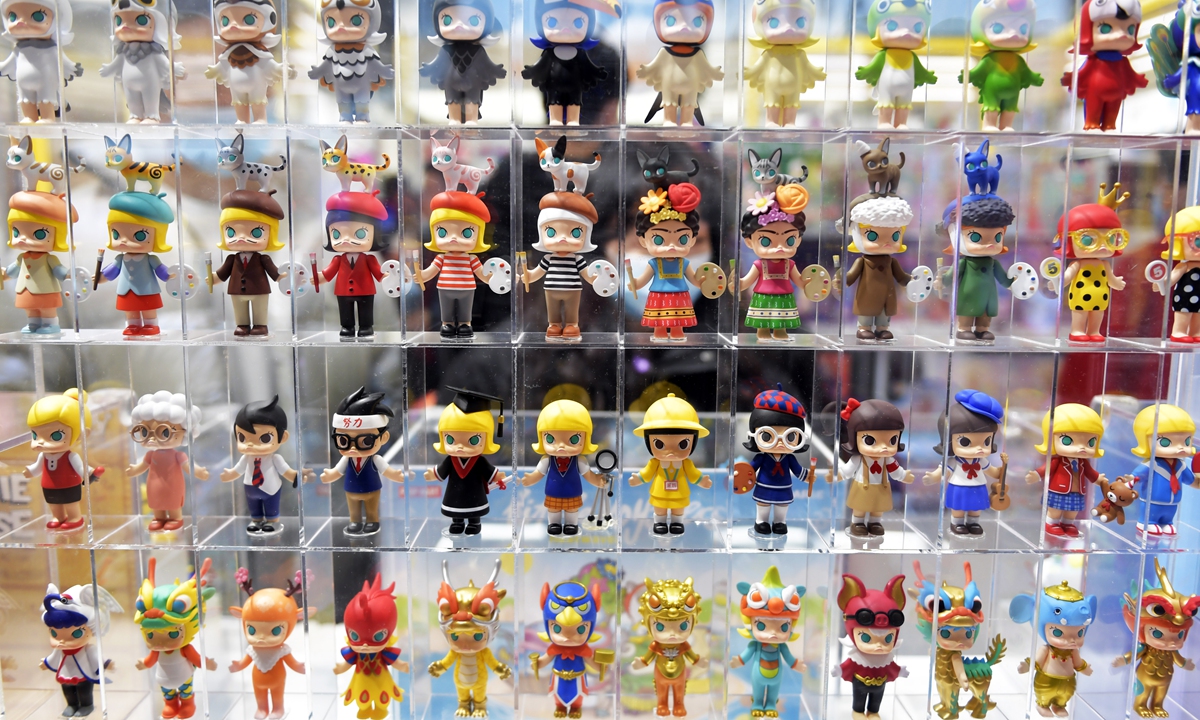
Blind box toys Photo: IC
The year 2024 is likely to witness a change among Gen Z consumers, as the pursuit of cost-effectiveness will not necessarily remain the driving force in decision-making, said an annual report released by the China Consumers Association. Instead, emotional release will become an important factor affecting the decision-making of the younger generations. Young people are paying more to pamper themselves. Experts said the new trend reflects a healthy lifestyle and expected to see further growth.
More and more consumers are willing to pay for emotional value and that this facet is expected to become a new consumption hotspot in the future, said the report.
Take online shopping platforms as an example. Sales of a stress ball toy rabbit with a price of about 5 yuan (71 cents) surpassed the 100,000 mark this year, while many text-based mobile phone cases and T-shirts with emotional soothing words also became popular. What is totally different from previous market demand, these products may not have practical uses and some are even virtual.
One item on Alibaba's Taobao platform, named "Brain of Einstein," became one of the top 10 selling products of 2023. As a virtual product, delivery is not an issue. After spending a few yuan, customers immediately can use this "intelligence boosting" item to cheer themselves up.
Obviously, what young consumers are after is more than just a commodity. Rather, they are looking for something to lift the negative emotions they feel in daily life. As Gen Zers take over as the main demographic among consumers, they are bringing their stronger demand for emotional satisfaction and spiritual enjoyment.
Lu Yanxia, a motivational psychology and emotional expert, told the Global Times on Tuesday that purchasing items to please oneself is a healthy lifestyle with more autonomy and certainty.
"With their planned budgets, young consumers are fairly clear about what they want," Lu said.
Li Wei, a young consumer, told the Global Times that she likes to buy some snacks or order some favorite dishes to make herself happy. To stay healthy, Li does not turn to foods with high sugar and calories. Instead, she prefers to slowly enjoy taste test dishes like Mao Xue Wang, or boiled blood curd with spicy sauce, and other spicy foods from other shops to compare the way they were cooked.
Some other young consumers are even more extreme, trying snacks with a lot of sugar or strong flavors.
Zhao Weihua, a professor of sociology at Beijing University of Technology, told the Global Times that she finds the new trend reflects the rich options of today's era and as a result, young consumers are eyeing novelty, fun and things that make them feel good.
"This is an aspect that indicates consumption is improving," Zhao said.
Cao Lei, an e-commerce director at the consultancy Internet Economy Institute, told the Global Times on Tuesday that these novelty commodities reflect young people's need for things that provide emotional value, as today's fast-paced modern life is filled with anxiety and stress.
"People pay more attention to self-care and emotional satisfaction. An emotional economy that stresses healing and pleasing oneself has emerged," Cao noted. From his observation, the new trend has created new consumption scenarios such as collecting mystery boxes, or "blind boxes," raising plants, and customizing stress ball toys are all part of this new trend.
Zhao said that Gen Zers are paying more attention to a sense of ritual and they like to reward themselves. Zhao also noted that society is becoming more individualized, at the same time goods are getting more diversified.
From Cao's perspective, many netizens appear to be more enthusiastic about makeup. "The concept of pleasing oneself is accepted by more people. It has become the main catalyst for beauty consumption," he said.
According to Cao, one consumer said in a survey that "In the past, makeup was more about being seen be other people, but in recent years, I care more about making myself happy."
Moreover, Lu compared consumers seeking to make themselves happy to impulsive consumers. They are totally different, she noted.
"From the perspective of motivation, self-pampering is more self-centered, with the aim to make oneself happier, more comfortable and satisfied. For instance, it could be a book one longed to read or a ticket to a concert, all these are about enjoying life, while impulsive consumption involves making a decision last minute, without considering practical needs," said Lu.
The author is a reporter with the Global Times. life@globaltimes.com.cn




